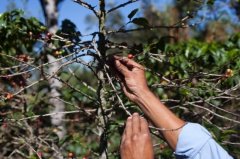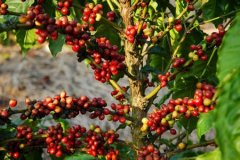American media: Nestl é promotes a business model in Yunnan to encourage farmers to grow coffee
Forbes magazine reported on May 14 that at the turn of the century, coffee trees were planted instead of tea trees in the hilly areas of southern Yunnan due to the entry of Nestl é. This has also succeeded in creating huge new wealth for the local area and changing the way of life of local farmers.

It is reported that in 1997, when Nestl é chose the source of coffee beans for its Dongguan factory, it was attracted by Yunnan's fertile volcanic soil and built a 20-hectare experimental plot in Xishuangbanna. In 2002, Nestl é opened a service station in Yunnan to provide free training in planting and soil analysis for local ethnic minorities and sell seeds to them at low prices. Various measures make local residents feel that growing coffee is a worthwhile thing to do.
Today, more than 2000 farmers in Yunnan have participated in the Nestl é project. These farmers grow coffee beans and then sell them to coffee merchants, including Nestl é, to make a profit. Last quarter, Nestl é produced 11500 tons of coffee beans in Yunnan, equivalent to 20 per cent of Yunnan's total crop output in that quarter. The Nestl é project also provided jobs for 25000 local residents.
Interestingly, Nestl é has been buying coffee beans from local farmers according to the New York coffee exchange rate. But since local farmers learned to look up the trend of New York coffee exchange rates online, they began to hoard goods and wait until the best time to sell them. Nestl é has also had to change its buying strategy. "after years of development, our manufacturers have become real businessmen," said De Smit, Nestl é's service station manager in Yunnan.
Important Notice :
前街咖啡 FrontStreet Coffee has moved to new addredd:
FrontStreet Coffee Address: 315,Donghua East Road,GuangZhou
Tel:020 38364473
- Prev

The US government is anxious to allocate funds to help Central American farmers fight against it.
Guatemalan farmers show coffee beans damaged by fungi. Coffee is also "sick".
- Next

Climate change may lead to the extinction of wild coffee in 2080
According to foreign media reports, according to researchers at the Royal Botanical Gardens, if global climate change continues, plants from major coffee bean producing areas will be affected, unable to provide high-quality coffee bean products, and coffee may become extinct in 2080.
Related
- The ceremony is full! Starbucks starts to cut the ribbon at a complimentary coffee station?!
- A whole Michelin meal?! Lucky launches the new "Small Butter Apple Crispy Latte"
- Three tips for adjusting espresso on rainy days! Quickly find the right water temperature, powder, and grinding ratio for espresso!
- How much hot water does it take to brew hanging ear coffee? How does it taste best? Can hot water from the water dispenser be used to make ear drip coffee?
- What grade does Jamaica Blue Mountain No. 1 coffee belong to and how to drink it better? What is the highest grade of Blue Mountain coffee for coffee aristocrats?
- What are the flavor characteristics of the world-famous coffee Blue Mountain No. 1 Golden Mantelin? What are the characteristics of deep-roasted bitter coffee?
- Can I make coffee a second time in an Italian hand-brewed mocha pot? Why can't coffee be brewed several times like tea leaves?
- Hand-brewed coffee flows with a knife and a tornado. How to brew it? What is the proportion of grinding water and water temperature divided into?
- What is the difference between Indonesian Sumatra Mantinin coffee and gold Mantinin? How to distinguish between real and fake golden Mantelin coffee?
- What does bypass mean in coffee? Why can hand-brewed coffee and water make it better?

